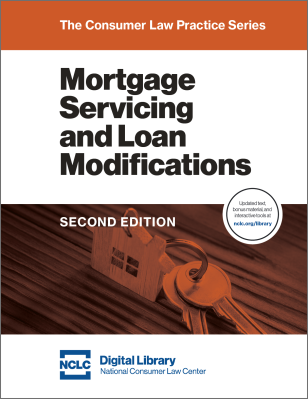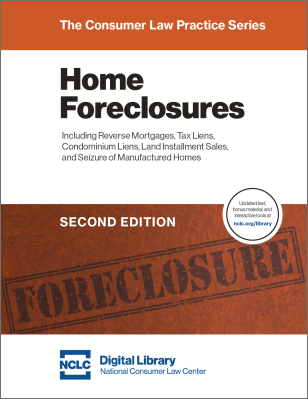With the ending of COVID-19 foreclosure moratoria and mortgage payment forbearances, homeowners in large numbers have a renewed need for mortgage loan modifications. Options to do so are set out in NCLC’s Mortgage Servicing and Loan Modifications, especially section 12.3, “Relief for Borrowers with COVID-19 Hardships” which is presently free to the public.
Many FHA-insured borrowers though have faced significant obstacles to obtaining a mortgage loan modification, where their loan involves a co-borrower and the co-borrower is unavailable. Mortgage servicers have generally allowed a mortgage modification only where the absent co-borrowers execute the loan modification agreement. But that may, as a practical matter, be impossible because death, divorce, separation, domestic violence or other significant life events involving the co-borrower.
A June 29 update to HUD’s Single Family Housing Policy Handbook, 4000.1 (June 29, 2022), effective September 26, 2022, clarifies that FHA does not require unavailable co-borrowers to execute FHA mortgage loan modification agreements. This is an important policy clarification that should help borrowers more easily access alternatives to foreclosure.
Fannie Mae and Freddie Mac Already Excuse Absent Borrowers from Executing Loan Modifications
Fannie Mae and Freddie Mac presently have policies in place that allow servicers to excuse the participation of an absent co-borrower from executing a loan modification. For example, Freddie Mac’s policy specifies multiple instances where the servicer can proceed with loss mitigation without a borrower: death, divorce, legal separation, mental capacity, military deployment, and other special circumstances. Also excused is a person other than a domestic partner who has executed a quitclaim deed and abandoned the home, and someone who is listed on the mortgage but not obligated on the loan, providing that the mortgage agreement allows the borrower to unilaterally agree to loan modifications. See Freddie Mac Servicer Guide, 9206.13(e) (June 29, 2022).
HUD’s Old Policy Left Too Much Discretion with FHA Mortgage Servicers
Unlike the Freddie Mac policy, the current version of HUD Handbook 4000.1 (Nov. 9, 2021), effective May 9, 2022 until September 26, 2022, and prior versions provided no clear guidance as to when absent co-borrowers can be excluded from participating in FHA loss mitigation, both with regard to standard and COVID-19 relief.
In its discussion of FHA-HAMP trial plans, previous versions of the handbook allowed for exclusion of absent co-borrowers after a death or divorce, but the discussion was not incorporated explicitly into other sections of the handbook, including the section on requesting loss mitigation. Moreover, previous versions of the handbook repeated multiple times the requirement that all borrowers must participate in the FHA loss mitigation process, without any reference to the death and divorce or any other exceptions.
This lack of clarity led to inconsistent application of the policy and harm to FHA mortgage borrowers. Advocates working with borrowers frequently complained that they were unable to proceed with loss mitigation without the participation of an absent co-borrower, even if they mentioned that domestic violence was involved. While escalating the issue at various levels of review often has been able to address problems, the vast majority of borrowers do not take such escalation steps and do not have access to advocates to help them do so. As a result, there was a clear need for HUD to follow for FHA loans the Fannie Mae and Freddie Mac approach to absent co-borrowers.
HUD’s June 29 Handbook Provides FHA Borrowers with Needed Clarity
The revised Handbook 4000.1 published on June 29, 2022, squarely addresses the problem, effective on September 26, 2022. It provides that:
The Mortgagee may exclude certain signatories to the Agreement or waive the need for a quit claim deed because of divorce, legal separation, domestic violence, mental incapacity, military deployment, or abandonment if the Mortgagee can ensure HUD’s first lien position and the Agreement is enforceable under state and local law.
Handbook 4000.1, at 963 (June 29, 2022)
It also provides that the lender is required to complete an evaluation of a defaulted mortgage for appropriate loss mitigation options and the lender must:
[D]etermine if the Borrower’s circumstances may require exclusion of certain co-Borrowers due to divorce, legal separation, domestic violence, mental incapacity, military deployment, or abandonment to comply with state, local and federal servicing laws, and the Mortgagee meets the requirements in Loss Mitigation Agreements.
Handbook 4000.1, at 960 (June 29, 2022)
Disputing a Servicer’s Refusal to Exclude a Co-Borrower
While servicers for at least FHA, Fannie Mae, and Freddie Mac mortgage loans should exclude co-borrowers under appropriate circumstances from executing a mortgage modification agreement, servicers still may not do so. It may be necessary to press for exclusion of a co-borrower.
The HUD Handbook 4000.1 (June 29, 2022) states that for an FHA mortgage loan modification application, the lender must determine whether the borrower’s circumstances require exclusion of a co-borrower from the execution requirement for the FHA loan modification. The lender then may exclude the co-borrower.
While the actual exclusion is thus voluntary, there must be a determination whether the co-borrower should be excluded. Effective September 26, any time an FHA mortgage servicer refuses to exclude the co-borrower, the other borrower should seek to learn the nature of the servicer’s determination as to why the borrower’s circumstances did not require exclusion. One option might be to send the servicer a “request for information” for an explanation of the grounds for this determination.
If a mortgage servicer refuses to exclude a co-borrower, often the first step might be to ask to speak to a supervisor. The borrower may also appeal any denial that results from the failure to exclude the absent co-borrower, and the servicer’s supervisory staff not involved in the original decision must review the appeal and notify the borrower in writing of their decision. The borrower can also complain directly to the mortgage’s owner or insurer.
Fannie Mae, Freddie Mac, and FHA have escalation departments that might intervene, if pushed, to address a refusal to exclude a co-borrower. Contacts with helpful employees should be fostered and assiduously maintained.
- For Fannie Mae, contact the Fannie Mae Resource Center at 800-2FANNIE (800-232-6643), Option 4.
- Freddie Mac’s loss mitigation is done on a national basis. Call 1-800-FREDDIE and access the customer service representative from the initial menu.
- For FHA-insured mortgages, borrowers can escalate their cases to the National Servicing Center (NSC) in Oklahoma City, (877) 622-8525.
Advocates Contacting NCLC to Report Servicer Non-Compliance
NCLC cannot represent homeowners with individual loan modification requests. But advocates are encouraged to contact NCLC at [email protected] with information on servicer compliance with applicable requirements to exclude a co-borrower from being required to execute a loan modification agreement. NCLC may also be able to provide advice for advocates on how to press servicers to alter their initial decision refusing to exclude the co-borrower.



